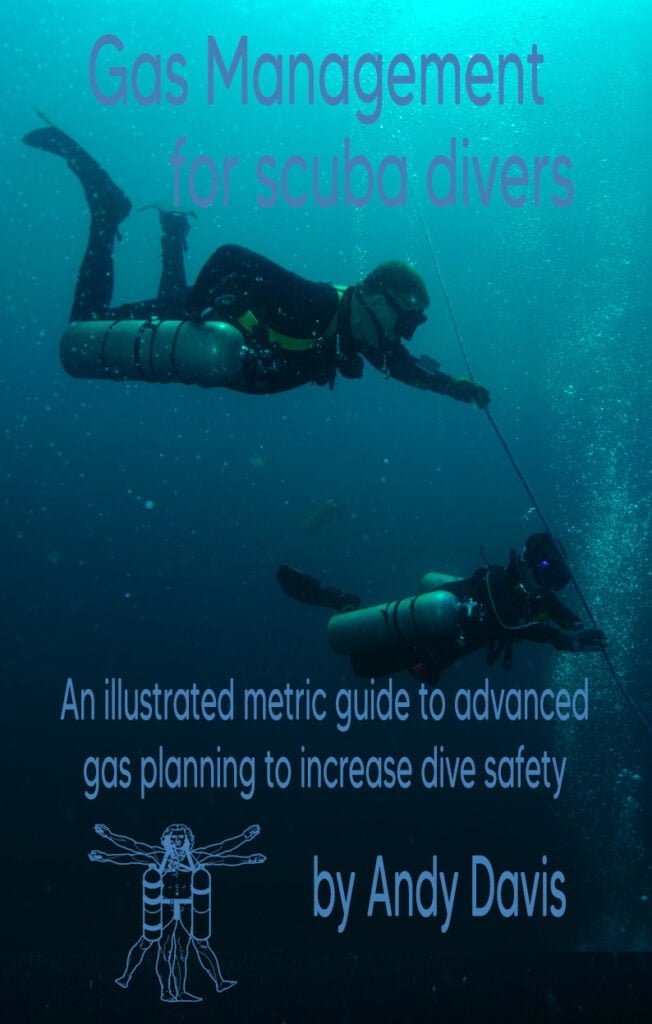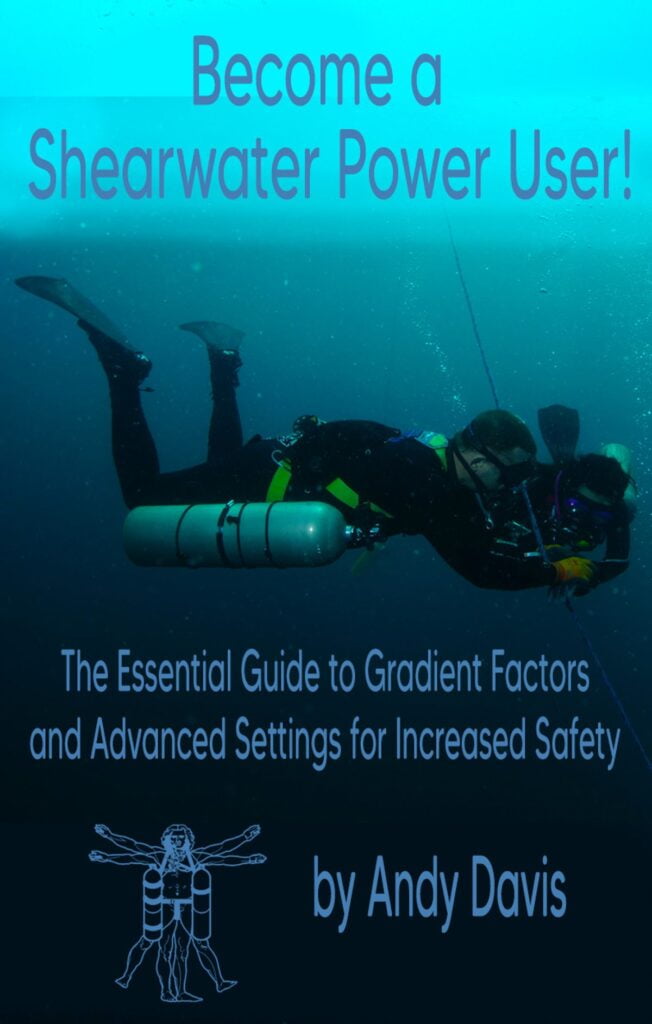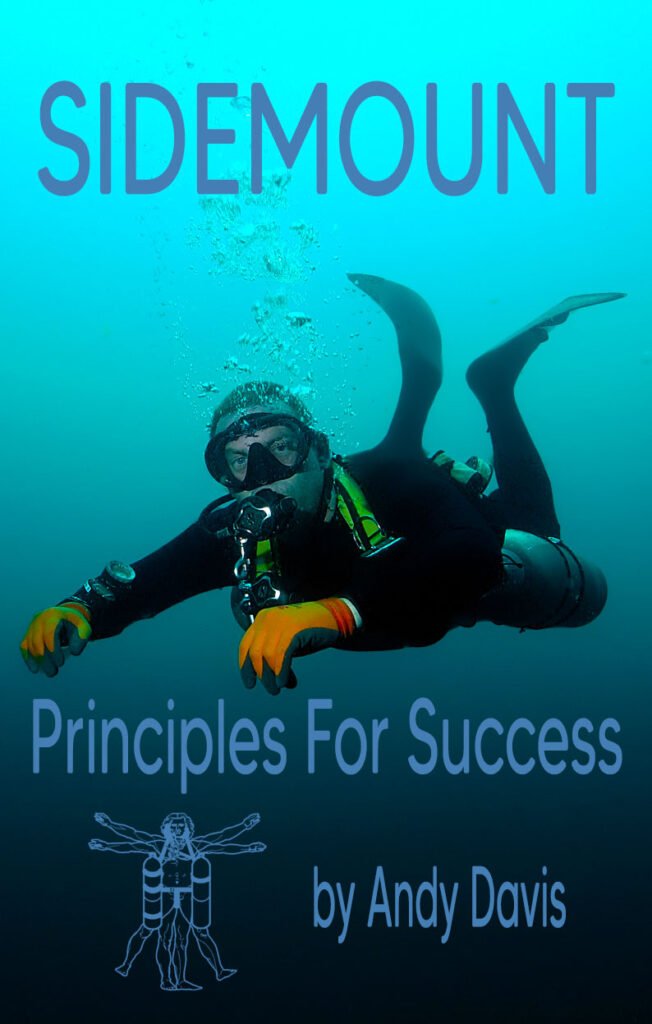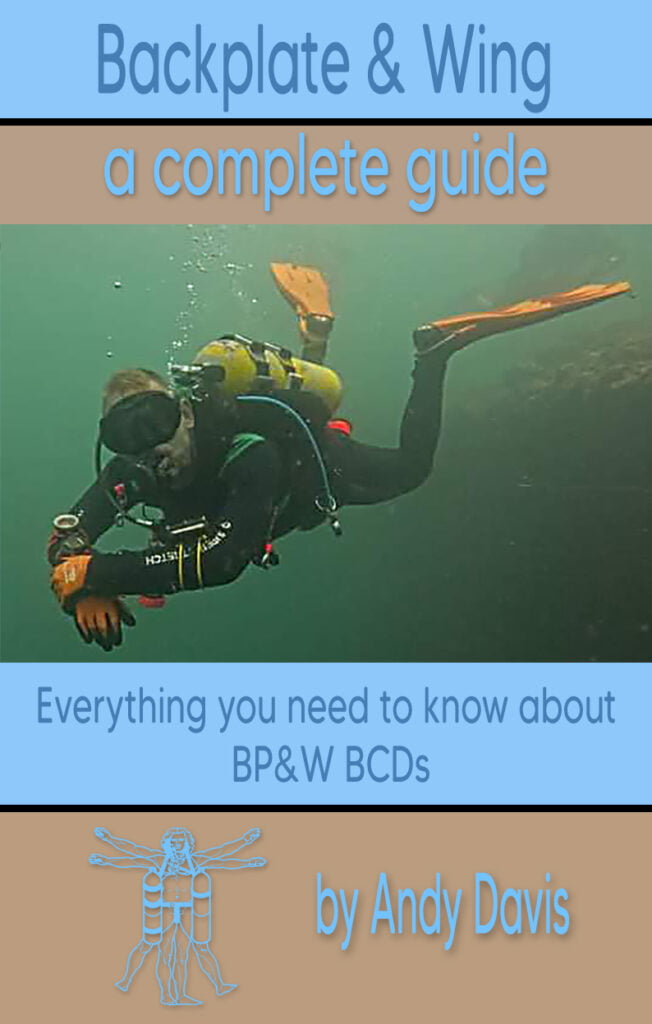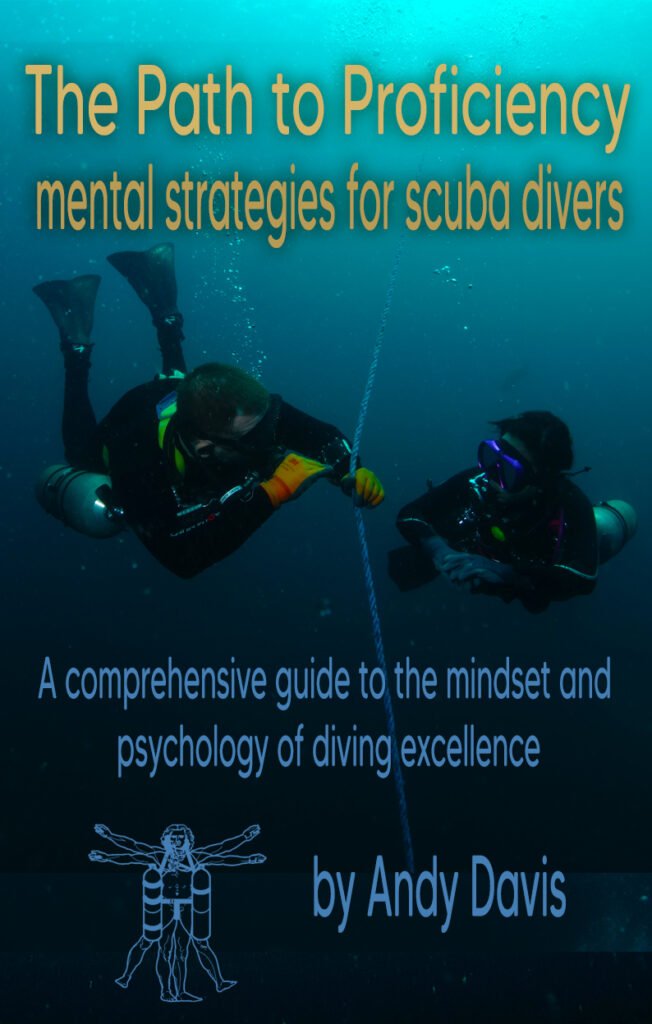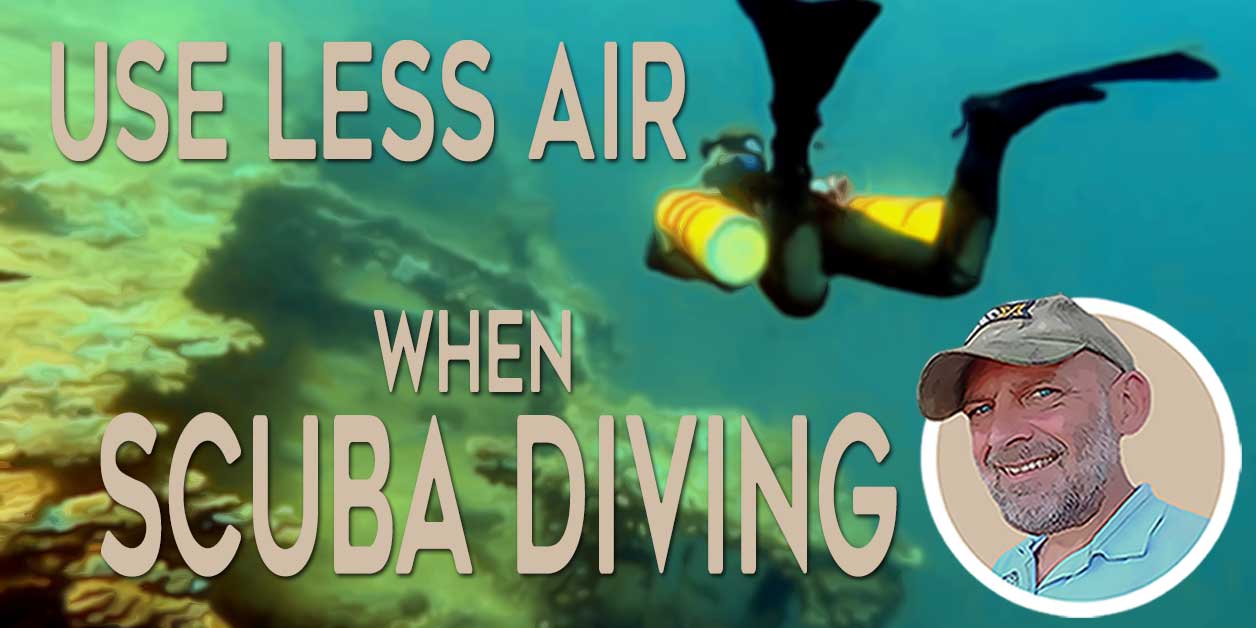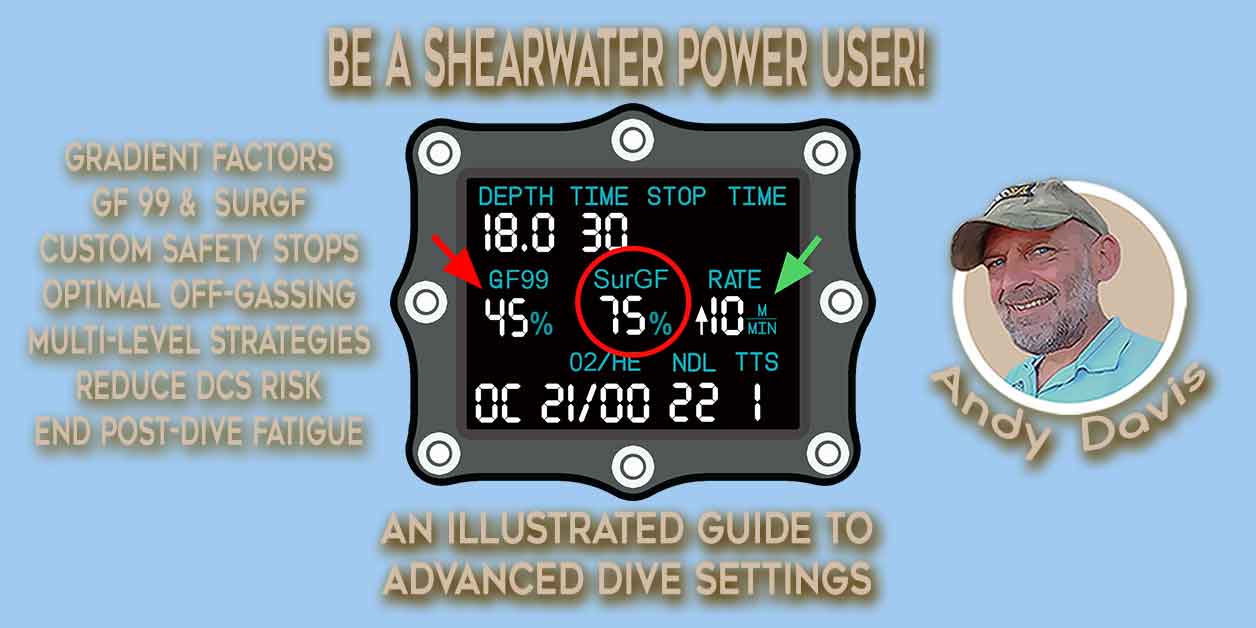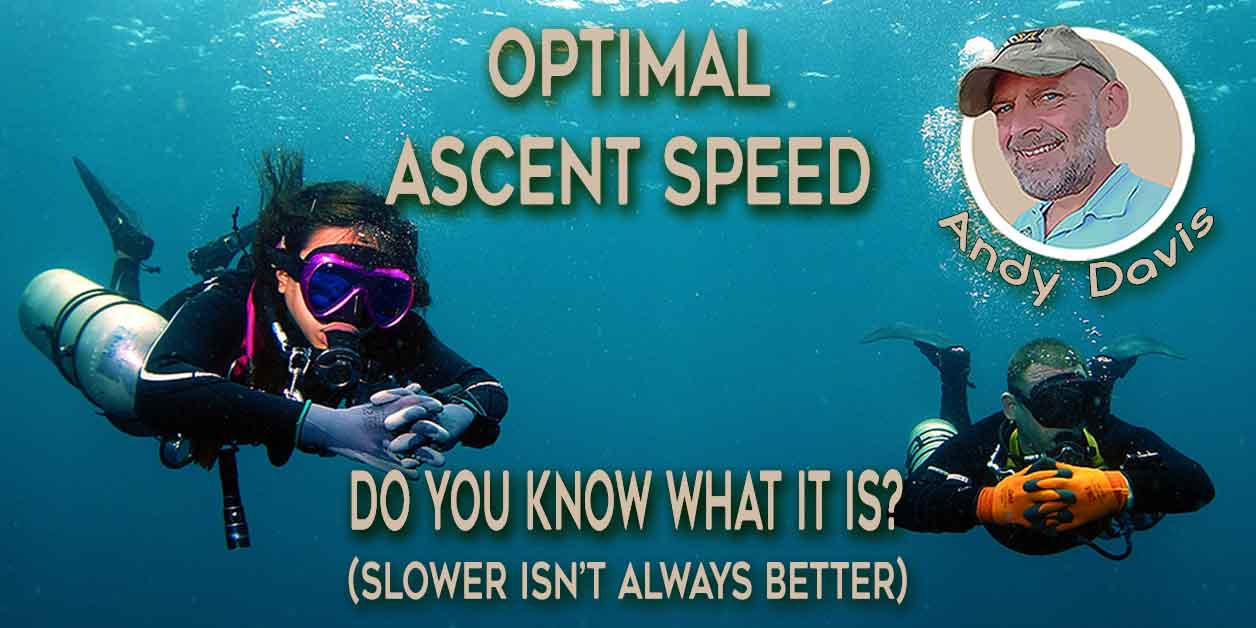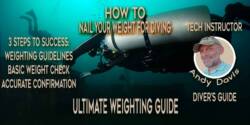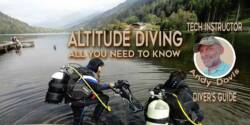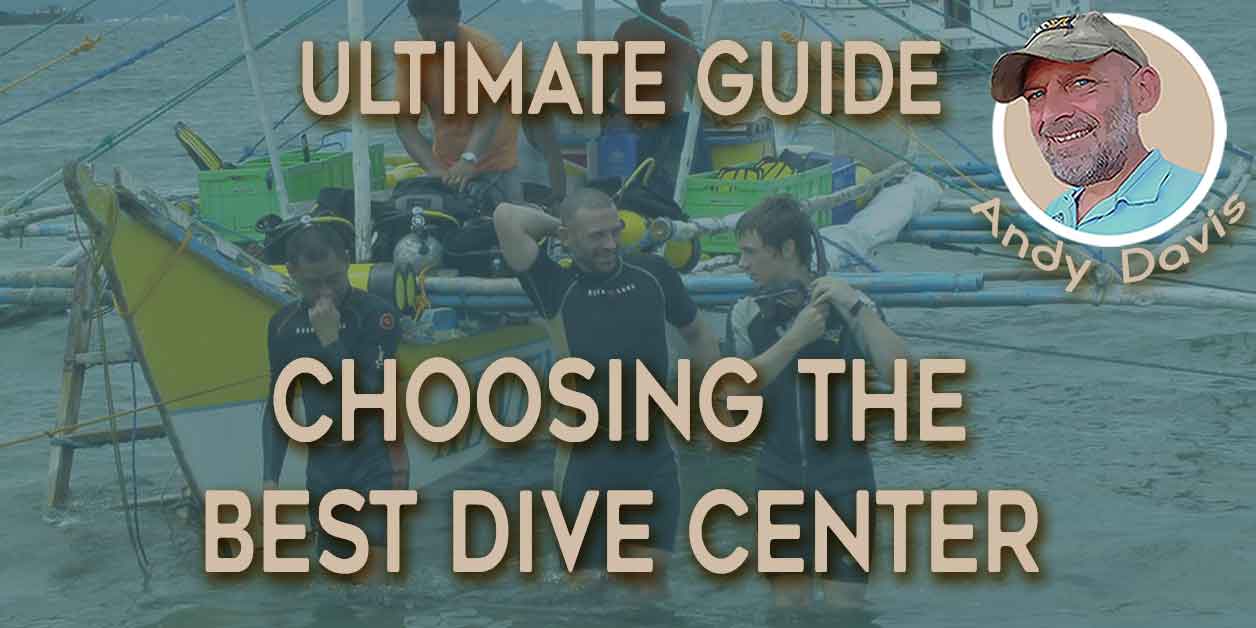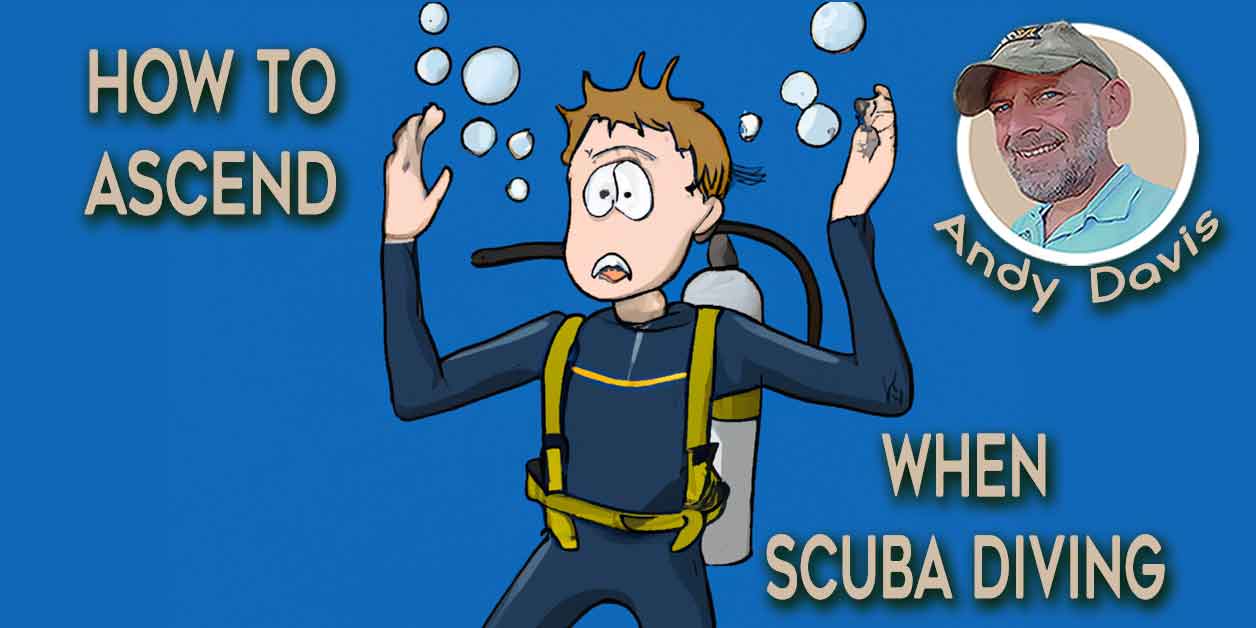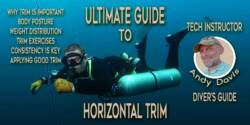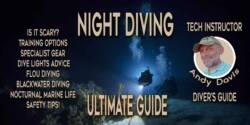The Ultimate Beginners Guide to Starting Scuba Diving
Diving into the underwater world can be an exciting and thrilling experience, but before you take the plunge, it is important to understand the basics of scuba diving. This guide will provide you with all the information you need for starting scuba diving and help you get the most out of your underwater experience.
What is Scuba Diving?
Scuba diving is a type of underwater diving where divers use self-contained underwater breathing apparatus (SCUBA) to breathe underwater. This allows them to stay underwater for longer periods of time, and explore the underwater world for longer times than in activities like freediving, snorkeling, and swimming.
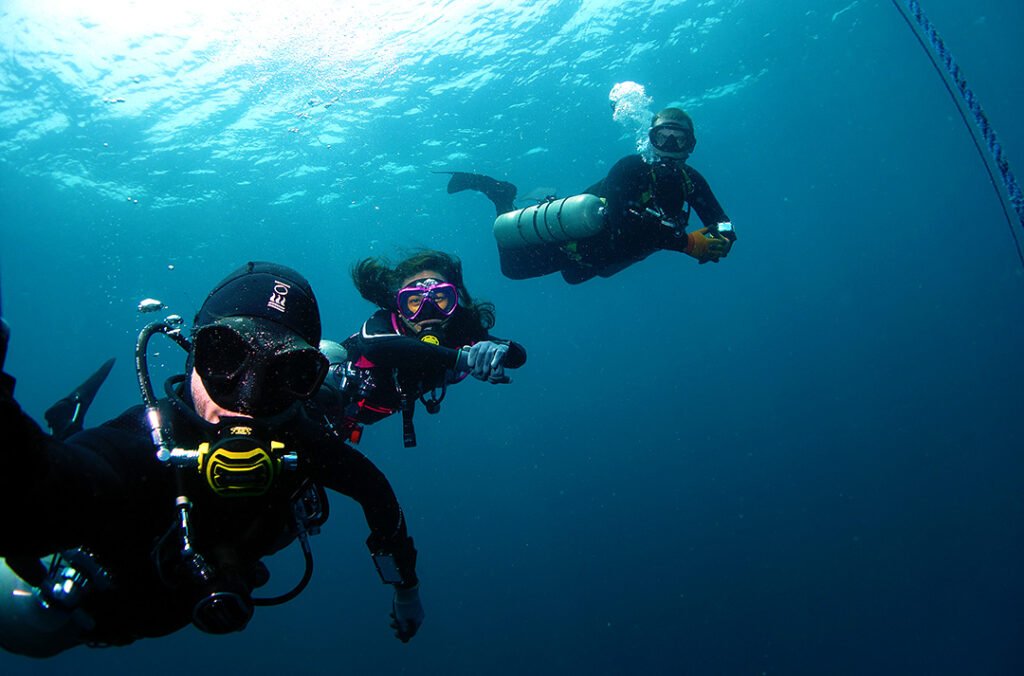
Why is Scuba Diving Popular?
Scuba diving is popular for several reasons:
- Adventure: Diving allows individuals to explore and experience the underwater world, which is often captivating and mysterious.
- Natural beauty: Scuba diving provides an opportunity to see a wide range of marine life and underwater landscapes, from vibrant coral reefs to shipwrecks and other historical sites.
- Relaxation: Diving can be a form of stress relief and relaxation for many people, as it allows them to escape the demands of daily life and immerse themselves in a serene and peaceful environment.
- Physical challenge: Scuba diving can also be physically challenging, providing an adrenaline rush and a sense of accomplishment for those who participate.
- Sense of community: Scuba diving often attracts like-minded individuals who enjoy exploring and discovering new things together, creating a sense of camaraderie and community among divers.
Is Scuba Diving Safe?
Scuba diving is a relatively safe activity, but it does come with certain risks. To minimize these risks, it’s important to follow proper safety procedures and obtain the necessary training and certification. Before starting scuba diving, you’ll need to complete a scuba diving certification course that teaches you the skills you need to dive safely. This course will cover topics such as dive planning, gear selection, underwater communication, and emergency procedures.
What are the Risks of Scuba Diving?
As with any physical activity, scuba diving comes with certain risks. Some of the most common risks include decompression sickness, barotrauma, and nitrogen narcosis. However, these risks can be minimized by following the safe diving practices taught when you certify as a scuba diver.
Decompression Sickness (DCS)
Decompression sickness (DCS), also known as “the bends,” is a condition that can occur when divers ascend too quickly. This can cause nitrogen bubbles to form in the blood, leading to joint pain, fatigue, and in severe cases, paralysis. To minimize the risk of decompression sickness, divers must properly plan and conduct their dive using either dive tables or a diving computer. to keep both depth and time within safe limits.
Barotrauma
Barotrauma is an injury caused by sudden changes in air pressure. This can occur when a diver ascends or descends too quickly, causing damage to the lungs, sinuses, or ears. To minimize the risk of barotrauma, divers must descend and ascend slowly and equalize the pressure in their ears and sinuses regularly.
Drowning
The dive can drown if their gas supply empties or if the diving regulator malfunctions. To minimize this risk, divers use a submersible pressure gauge to constantly monitor their gas supply. Maintaining situational awareness by minimizing task loading and distractions helps ensure that the diver does not inadvertently fail to monitor their gas. If the regulator fails, scuba divers are trained to share gas with a buddy or, in worst-case scenarios, make an emergency ascent to the surface without gas to breathe.
Nitrogen Narcosis
Nitrogen narcosis is a condition that starts becoming debilitating when a diver descends to depths greater than 30 meters/ 100 feet. The pressure of nitrogen within the breathing gas at depth has a sedative effect and can impair a diver’s cognitive abilities; decreasing their judgment and reaction time. To minimize the risk of nitrogen narcosis, divers should avoid diving to depths greater than their training and experience allow. Helium gas can be added to the divers’ cylinder to nullify the effects of narcosis; although this is a costly option and few diving agencies offer the necessary training at recreational levels.
Marine Life Hazards
Divers may also encounter hazardous marine life while diving, such as jellyfish, sea snakes, red corals, and venomous fish. To minimize the risk of marine life injury hazards, divers must always be aware of their surroundings and follow guidelines taught for safe interactions with marine life.
Equipment Failures
Diving equipment failures can also pose a risk to divers. To minimize the risk of equipment failures, divers must regularly maintain and check their gear before each dive. They should also have proper training in emergency procedures and apply a buddy system or team approach to diving. Some divers opt to carry backup life-support equipment; especially for deeper dives or when entering wrecks or caves when the time and distance to reach the surface is greater.
Dive Site Hazards
Dive sites can also pose hazards, such as strong currents, limited visibility, discarded fishing nets and line, and underwater structures. To mitigate these risks, it is important to conduct a thorough dive briefing and to dive within your skill level and experience. If you encounter a problem while diving, it is important to remain calm and follow your training and dive plan.
Oxygen Toxicity
Oxygen toxicity occurs when the body is exposed to high levels of oxygen for a prolonged period of time. This can cause symptoms such as convulsions and unconsciousness; which can easily lead to drowning. To minimize the risk of oxygen toxicity, divers should use a dive computer or follow dive tables to determine the maximum safe oxygen partial pressure for their dive, and avoid using enriched air nitrox (EAN) if they have not been trained to do so.
How do I Get Certified to Scuba Dive?
To become certified to scuba dive, you must complete a scuba diving course from a training agency-recognized dive center or instructor. During the course, you will learn about dive equipment, dive theory, dive planning, and dive skills. You will also complete a series of shallow water skills practice and actual scuba dives to demonstrate your proficiency in the skills taught.
Choosing the Right Scuba Diving Course
There are various scuba diving courses available for individuals of different skill levels and interests. Before you start scuba diving, it is important to consider your personal goals, physical abilities, and the type of diving you might want to do.
For beginners, the Open Water Diver course is the most popular and recommended option. This course covers the basics of scuba diving, including dive theory, dive equipment, dive planning, and in-water skills. You will also learn about dive tables, dive computers, and dive safety, as well as how to choose and use dive gear.
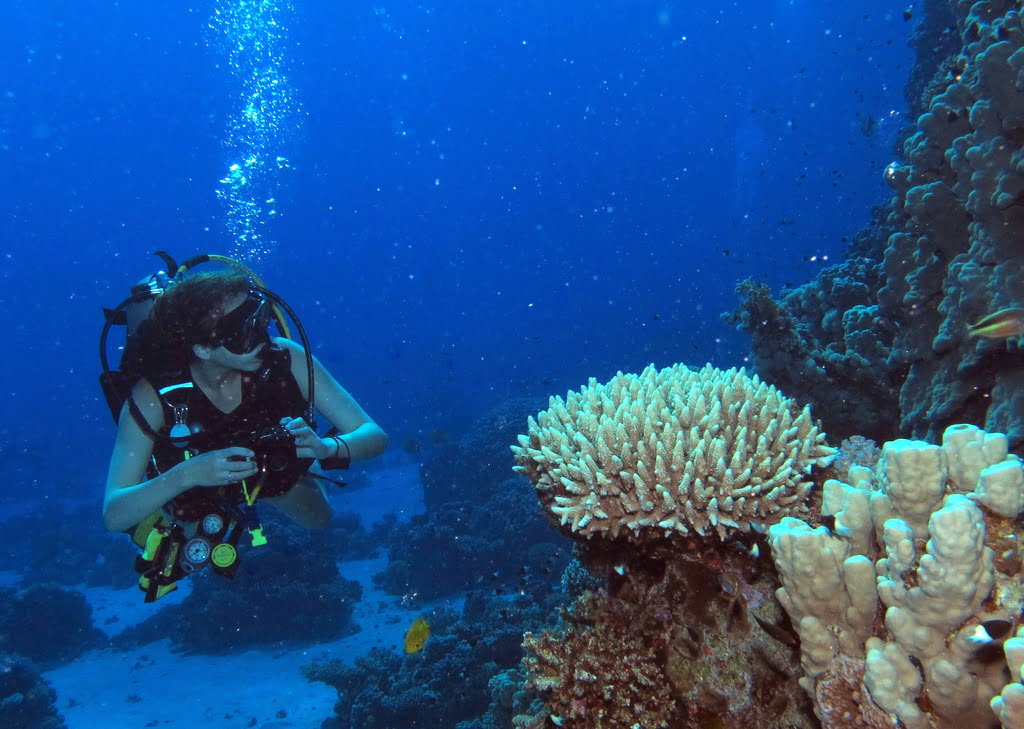
How to Identify a Good Scuba Diving Course
When looking for a good scuba diving course, it’s important to consider the following factors:
- Accreditation: Look for a dive course that is accredited by a recognized diving organization. This ensures that the course meets the formal standards for quality, safety, and training.
- Instructor Qualifications: Make sure the instructor is qualified and experienced, with a good reputation in the diving community. The instructor should have a current professional diving certification and be up-to-date on first aid and emergency response training. Instructor experience can range from as low as 25 hours total spent diving up to tens of thousands of hours experience. This can make a huge difference to the quality of a course.
- Course Content: A good scuba diving course should cover a range of topics, including dive theory, diving techniques, and emergency procedures. The course should be designed to provide a comprehensive understanding of scuba diving and the skills required to dive safely.
- In-Water Training: Look for a course that offers more in-water training time, with plenty of opportunities to practice, perfect and ingrain your diving skills. Training should go beyond merely getting things right, it should ensure you cannot get things wrong. Compare the number of hours and minutes of in-water practice that different courses offer.
- Course Length: A good scuba diving course should be comprehensive. It should be designed to give you enough time to learn, repeatedly practice and reliably ingrain the skills and knowledge you need to dive safely. Fast-track courses typically have poor results; causing less confidence, comfort, and competency after certification.
- Cost: While cost shouldn’t be the primary factor in choosing a scuba diving course, it’s important to look for a course that provides good value for money. Cheaper costs are not necessarily better value if the training is inadequate. Make sure the course includes all the necessary equipment and materials, and that there are no hidden costs.
- Reputation: Research the dive shop and individual instructor. Read reviews from past students to get a sense of their reputation and level of customer satisfaction. Peer reviews from other dive professionals can be especially useful; you can use diving social media groups to gather professional opinions.
- Training Best Practices: Scuba diving courses can be delivered using different methods of practice. In general, the current consensus is that neutral buoyancy training delivers better outcomes than courses that allow students to kneel on the floor when practicing skills.
This video demonstrates high-quality scuba training. These students are on their second session of skills training and are already comfortable and controlled in the water. Choose a scuba diving course that delivers results comparable to this.
The Differences Between Scuba Diving Training Agencies
There are a number of different scuba diving training agencies that will certify your training. The training agency determines the performance standards you must attain on your scuba diving course, designs the course syllabus, produces the study materials, and qualifies your instructor to teach.
When starting scuba diving and choosing a certification course, it can be helpful to consider which dive training agency best suits your long-term diving goals, individual needs, and personal beliefs about the value of training quality. In general, the more investment demanded by an agency’s training system, the more competency, comfort, and confidence you will enjoy after certification.
Mass market diving agencies
Mass-market agencies: i.e. PADI, SSI, and NAUI. These are very large agencies that typically focus on making scuba training more accessible. Scuba training courses tend to be cheaper, quicker, and easier to complete. Of course, fast-track and high-volume training have drawbacks:
- Courses will typically be less rigorous
- Student-to-instructor ratios may be higher
- Instructors themselves can be less than ideally experienced or expert.
Some divers do perceive an insufficient level of comfort, confidence, and competency when they are certified. Whilst training quality is ultimately determined by the individual instructor, prospective students need to be very selective about who they choose to provide their course.
Technical diving agencies
Technical diving agencies: i.e. RAID, TDI/SDI, and IANTD. These are smaller agencies that evolved from teaching high-level technical diving. They typically offer courses that have more stringent performance standards and a more comprehensive in-depth syllabus.
Additionally, there is a higher likelihood that the instructor is qualified and experienced to a very high level of diving proficiency. For that reason, the training tends to be more robust, courses can require more investment from the student with respect to cost, time, and effort.
DIR diving agencies
DIR agencies: i.e. GUE, UTD, and ISE. DIR (“Do It Right”) scuba training agencies are uncompromising in their training standards. Courses are very comprehensive and have a reputation for creating very capable and safe scuba divers. These courses are longer in duration to ensure ample practice time to acquire ingrained skills and high proficiency. Equipment and protocols are highly standardized and there is a strong emphasis on team diving.
These diving agencies have a training philosophy of “beginning with the end in mind”; each successive course prepares the student for the next level of training with the assumption that the diver will progress into technical or cave diving. Dive training courses from DIR agencies demand a high level of investment from students. Gaining qualifications can be challenging for some and the cost of courses and equipment is much more substantial.
Club-based diving agencies
Club-based agencies: i.e. BSAC and CMAS. These scuba certification agencies typically operate through paid-for club membership. Instructors are often volunteers and provide dive certification courses free of charge for members of their club.
Students only have to pay the cost of learning materials and their certification card. Club-based agencies are a good option if learning to dive in your home area and offer the added value of becoming part of an actively diving social group.
What are the Scuba Diving Certification Levels and what are their Limits?
To participate in scuba diving safely and responsibly, it is important to understand the different scuba diving certification levels and how they can help you progress as a scuba diver.
Scuba diving certification is internationally recognized proof of a scuba diver’s training and experience. It demonstrates that a diver has the knowledge and skills necessary to participate in scuba diving activities safely and responsibly.
Scuba diving certifications are issued by a variety of organizations, including RAID, PADI, SSI, NAUI, and others. Each organization has its own set of standards, but they all follow similar guidelines and principles.
Open Water Diver Certification
The Open Water Diver level certification is the first step for anyone who wants to become a certified scuba diver. This certification is entry-level for all scuba diving activities, available from any scuba training agency, and is recognized worldwide.
The Open Water Diver course covers the basics of scuba diving, including dive theory, dive equipment, dive planning, and dive skills. After completing the course and passing the exams and dives, you will be certified to dive to a maximum depth of 18 meters/60 feet.
Advanced Open Water Diver Certification
The Advanced Open Water Diver certification is the next step for those who want to expand their diving knowledge and experience. This certification includes five adventure dives, which can include deep diving, navigation, night diving, and more. By completing this certification, you will be able to dive to a maximum depth of 30 meters/100 feet.
Rescue Diver Certification
The Rescue Diver certification is designed to teach divers how to prevent and manage dive accidents and emergencies. This certification covers various rescue scenarios, including panicked divers, unconscious divers, and divers in distress. The course also covers self-rescue, dive first aid, and diving safety. After completing the course, you will be prepared to handle any diving emergency that may arise.
Master Scuba Diver Certification
The Master Scuba Diver certification is the highest recreational-level certification in scuba diving. To earn this certification, you must have completed five specialties, including the Open Water Diver, Advanced Open Water Diver, and Rescue Diver certifications, as well as have a minimum of 50 logged dives. This certification recognizes your experience and mastery of scuba diving and allows you to participate in a wide range of diving activities.
Divemaster Certification
The Divemaster certification is the first professional-level certification in scuba diving. This certification requires significant experience and training; and is designed to prepare divers to lead and assist in diving activities. The course covers dive theory, dive skills, dive leadership, and dive planning. After completing the certification, you will be able to work as a dive professional, guiding dives and assisting in dive operations.
What are the Physical Requirements for Scuba Diving?
To scuba dive, you should be in good physical health. You will be required to complete a medical questionnaire and, in some cases, obtain medical clearance from a physician before starting scuba diving. If you have any medical conditions or take any medications, it is important to discuss these with your dive instructor or physician to determine if they will affect your ability to dive.
To be able to scuba dive, a person must:
- Be in good health and medical fitness
- Be at least 10 years old (for PADI Junior Open Water Diver certification)
- Be able to swim
- Have adequate lung function
- Have no medical conditions that are contraindicated for diving:
- Heart conditions, such as angina, heart attack, or uncontrolled high blood pressure
- Epilepsy or seizure disorders
- Mental health conditions, such as depression or anxiety
- Respiratory conditions, such as asthma or chronic obstructive pulmonary disease (COPD)
- Neurological conditions, such as stroke or paralysis
- Ear, sinus, or other inner ear conditions
- Vision impairments, such as color blindness or near-sightedness
- Diabetes requiring insulin treatment
- Diving after recent surgery
- Pregnancy
It is important to note that these are general guidelines, and the final determination of a diver’s fitness to dive should be made by a physician who is knowledgeable about diving medicine. Additionally, some dive organizations may have additional requirements or restrictions.
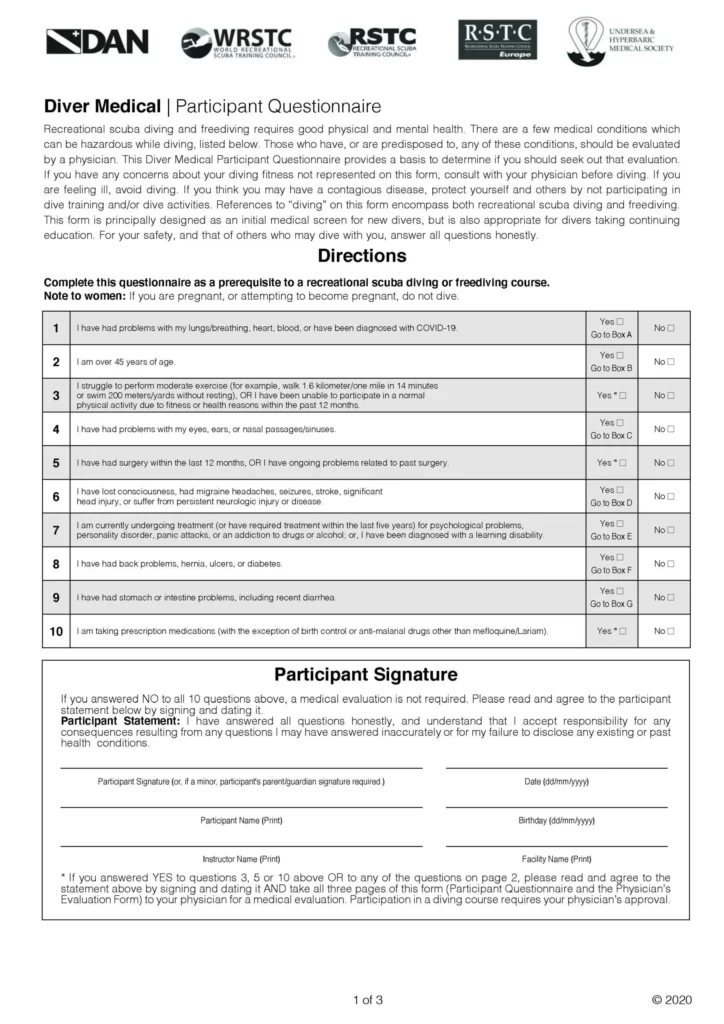
How Old Do You Have to Be to Scuba Dive?
Scuba diving has certain age restrictions, which vary based on the certification agency, the type of dive, and the location. In general, starting scuba diving is possible for children as young as 8 years old; if under the supervision of a qualified instructor.
The minimum age to obtain a scuba diving certification from most international diving organizations is 10 years old. This is the age at which a child can start diving independently of a dive professional, with only the supervision of a certified adult diver. Once a child reaches the age of 10, they can continue to dive and gain more experience, with the goal of becoming a certified diver themselves.
For adults, there is no upper age limit for starting scuba diving. However, it is recommended that divers over the age of 50 undergo a medical examination to ensure that they are fit to dive. This is especially important for older divers, as their bodies may have changed since their last dive, and they may be more susceptible to certain medical conditions that can affect their ability to dive safely.
Different certification agencies have their own age restrictions, which can vary slightly. The two most popular certification agencies are the Professional Association of Diving Instructors (PADI) and the National Association of Underwater Instructors (NAUI):
- PADI sets the minimum age to start learning how to scuba dive at 8 years old. Children aged 8 to 10 can enroll in the PADI Bubblemaker program, which teaches basic diving skills in a safe and controlled environment. PADI requires that children aged 10 and older must complete a Junior Open Water course before they can obtain their certification.
- NAUI sets the minimum age to start learning how to scuba dive at 10 years old. Children aged 10 to 14 can enroll in the NAUI Junior Scuba Diver program, which teaches basic diving skills and safety procedures. NAUI requires that children aged 14 and older must complete an Open Water Diver course before they can obtain their certification.
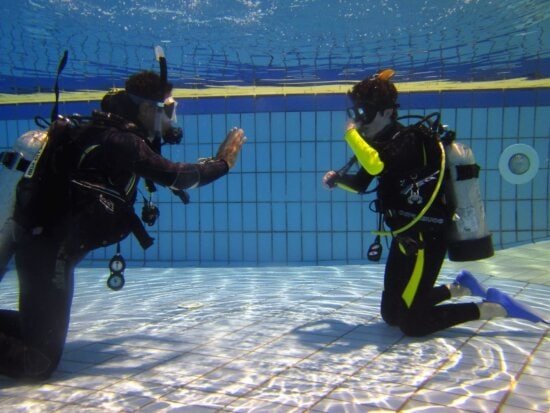
Is it hard to learn to scuba dive?
The difficulty of learning to scuba dive varies from person to person, but it is generally considered to be a relatively straightforward process with proper training and instruction. Starting scuba diving requires some physical fitness, basic swimming skills, and a willingness to learn and follow safety procedures.
However, some people may struggle with certain aspects of scuba diving, such as adjusting to the underwater environment or dealing with equipment, but with proper training and practice, these challenges can be overcome.
Can I Scuba Dive if I Have a Fear of Water?
It is possible to scuba dive if you have a fear of water, but it may require facing and overcoming your fears through training and practice. Scuba diving can be a challenging and intimidating experience for someone with a fear of water, but many people have successfully learned to dive despite their fears.
If you have a fear of water, it is important to find a scuba instructor who is experienced in working with people who have similar fears and to start with training in a controlled and supportive environment, such as a swimming pool. Gradually building your confidence and experience in the water can help you overcome your fears and learn to enjoy scuba diving.
However, it is important to understand that starting scuba diving can also be physically demanding and may require you to do things that are initially outside of your comfort zone, such as clearing your mask underwater or removing and replacing your regulator. If your fear of water is severe or debilitating, it may not be possible to safely participate in scuba diving, and you may need to seek other forms of therapy or treatment to address your fears before attempting to dive.
How Deep Can I Dive?
The maximum depth you can dive will depend on your certification level and the type of dive you are doing. For most recreational dives, the maximum depth is 40 meters (130 feet). Technical divers may dive deeper, but it is important to follow dive planning guidelines and never exceed the maximum depth allowed for your certification level.
Typical depth limits for increasing levels of scuba diving qualification levels are:
- Open Water Diver: 18m (60ft)
- Advanced Open Water Diver: 30m (100ft)
- Deep Diver: 40m (130ft)
- Technical Diver: 45-55m (147-180ft)
- Normoxic Trimix Diver: 65m (213ft)
- Full Trimix Diver: 90-100m (295-330ft) and beyond
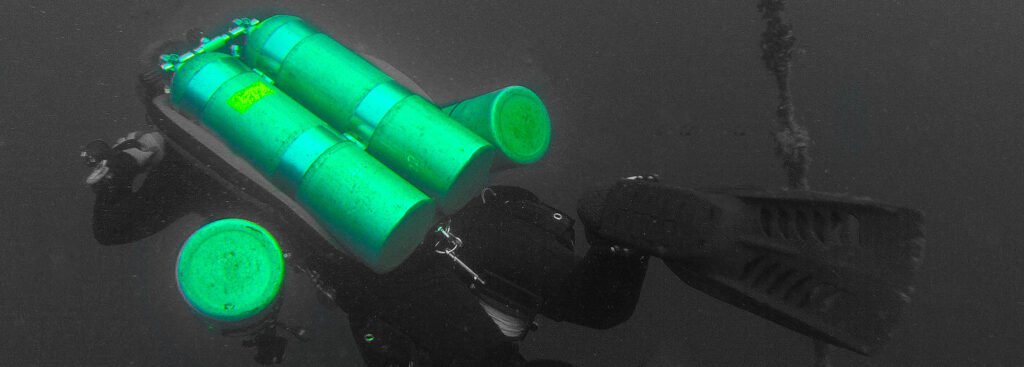
Why is 130 Feet / 40 Meters the Limit for Recreational Diving?
The 130-foot / 40-meter depth limit is a safety measure put in place by dive organizations to protect recreational divers from the dangers of diving at deeper depths. There are several factors that contribute to the risks associated with deeper diving, including:
- Decreased bottom time: As you dive deeper, the amount of time you can spend at the bottom decreases due to the increased pressure, and the need for longer decompression stops. This means that you have less time to explore the underwater world and complete your dive plan.
- Increased risk of decompression sickness: Decompression sickness is a potentially life-threatening condition that can occur when divers exceed their no-decompression limits or do not follow proper decompression procedures. Deeper dives increase the risk of decompression sickness due to the longer decompression stops required.
- Increased effect from nitrogen narcosis: This a condition that occurs when nitrogen, which is one of the gases in the air that we breathe, dissolves into the bloodstream at high pressure. This can cause a range of sedative symptoms, including reduced cognitive ability, flawed judgment, and even unconsciousness. The deeper a diver descends, the more nitrogen dissolves into the bloodstream and the more pronounced the symptoms can become.
- Increased risk of hypercapnia: Increasing depth causes your breathing gas to increase in density. Published scientific studies have proven that there is a limit to gas density, beyond which carbon dioxide (CO2) levels in the body can increase dramatically. This causes hypercapnia and CO2 narcosis which can debilitate a scuba diver. Diver’s Alert Network (DAN) has published recommended limits on gas density.
What is the Best Time of Year to Scuba Dive?
The best time of year to scuba dive will depend on where you are diving and the type of diving you want to do. Some popular diving destinations have year-round warm water and good visibility, while others have seasonal conditions that are best for diving at specific times of the year.
Your dive center or instructor can help you determine the best time to dive based on your goals and preferences.
Understanding the Equipment Used in Scuba Diving
Before starting scuba diving, you need to familiarize yourself with the equipment used in the sport. The main pieces of equipment used in scuba diving are the scuba tank, regulator, BCD (buoyancy control device), wetsuit, fins, mask, and weights.
The gear you’ll need for starting scuba diving depends on the type of diving you plan to do; especially the water temperature. However, there are some basic items that every diver needs. These include:
- A wetsuit or drysuit to keep you warm and protected in the water
- A scuba tank to provide you with air
- A regulator to control the flow of air from the tank to your mouth
- A BCD (buoyancy control device) to help you control your buoyancy underwater
- Fins to help you move through the water
- A mask to provide you with clear vision underwater
- Snorkel (optional)
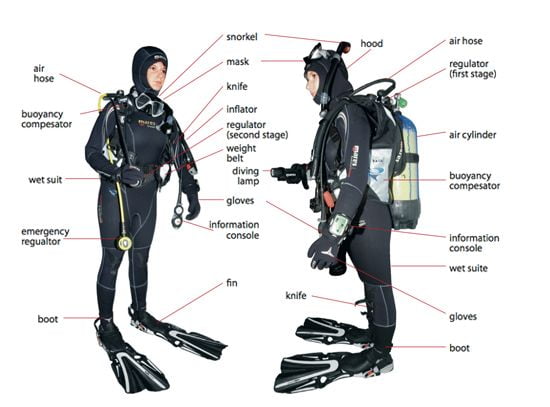
The scuba tank is the primary source of air while diving. The regulator is attached to the scuba tank and reduces the pressure of the air so it can be breathed easily. The BCD helps you maintain buoyancy and control your depth while diving. A wetsuit provides thermal protection and helps to insulate your body from cold water. Fins, a mask, and weights help you move more efficiently in the water.
What Kind of Diving Can You Do with a Scuba Diving Certification?
Once you’ve completed your scuba diving certification, the world is your oyster! You’ll be able to participate in a variety of different types of diving, including:
- Recreational diving: This type of diving is typically done in shallow waters and is focused on exploring the underwater environment.
- Specialty diving: This includes specialized diving activities, such as night diving, ice diving, underwater photography, videography, using dive propulsion vehicles (DPV), and more.
- Technical diving: This type of diving is more advanced and involves diving deeper and in more challenging conditions.
- Cave diving: This type of diving involves exploring underwater caves.
- Wreck diving: This type of diving involves exploring shipwrecks and other underwater structures.
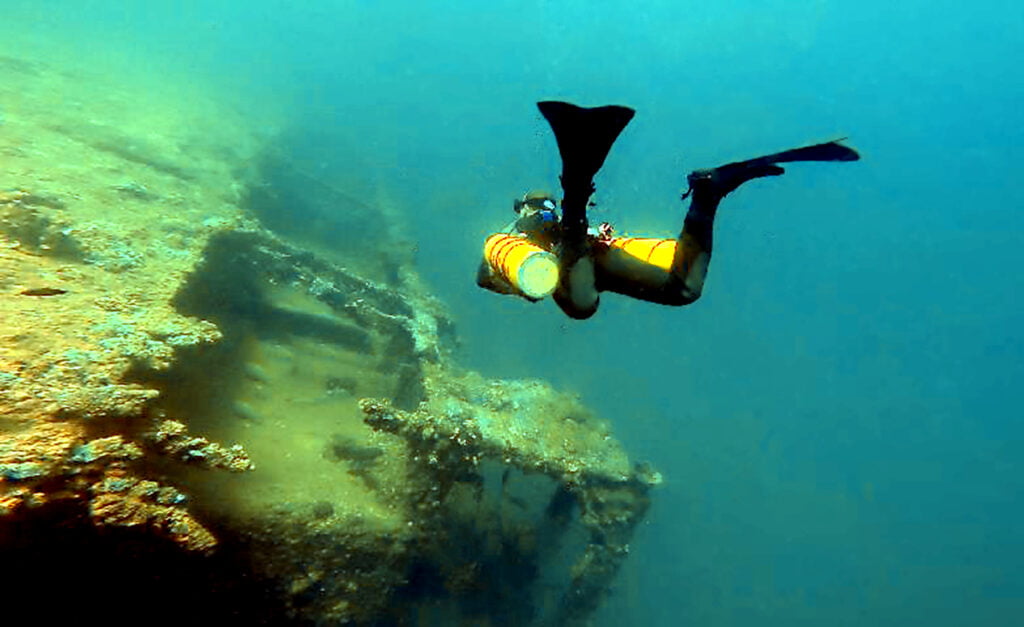
What are the Best Destinations for Scuba Diving?
There are many incredible destinations around the world that are ideal for scuba diving. Each destination offers its own unique underwater experience, so it is important to choose a destination that suits your interests, budget, and diving abilities. Soon after starting scuba diving most divers build a bucket list of sites and locations that they dream of visiting.
13 UNESCO World Heritage Sites for Scuba Diving
These diving locations have been recognized by UNESCO (United Nations Educational, Scientific and Cultural Organization) as World Heritage Sites due to their exceptional natural or cultural value. These sites can be explored by scuba divers, offering unique and educational experiences.
- Sipadan Island, Malaysia
- Tubbataha Reefs, The Philippines
- The Great Barrier Reef, Australia
- Aldabra Atoll, Seychelles
- Bikini Atoll, Marshall Islands
- Komodo National Park, Indonesia
- Cocos Island National Park, Costa Rica
- Galapagos Islands, Ecuador
- Rapa Nui National Park, Chile
- Barrier Reef Reserve, Belize
- Jeju Volcanic Island, Republic of Korea
- Fernando De Noronha, Brazil
- Cabo Pulmo National Marine Park, Mexico
- Rock Islands Southern Lagoon, Palau
Sipadan Island in Malaysia is a world-renowned dive site, that offers the chance to see a wealth of marine life, including turtles, barracuda, and schooling hammerhead sharks. The Philippines is a top destination for divers, offering a vast array of dive sites, including WWII wrecks, healthy coral reefs, and abundant marine life.
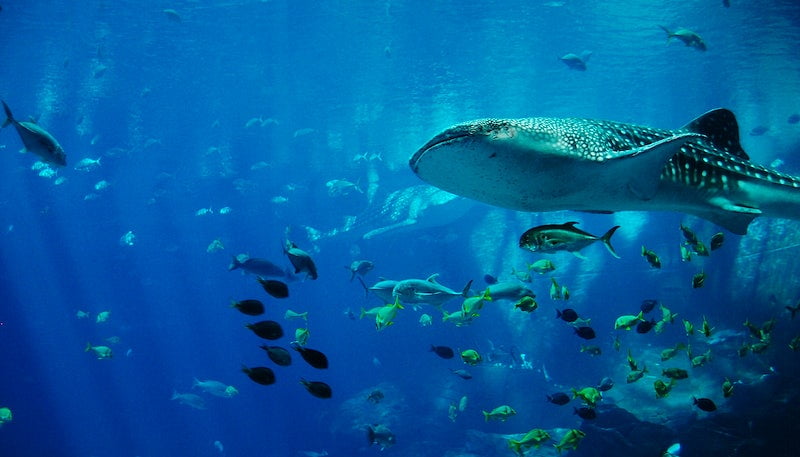
The Belize Barrier Reef Reserve System is the largest barrier reef in the Western Hemisphere and home to a wealth of marine life, including over 500 species of fish and hundreds of species of coral. This incredible natural wonder is a UNESCO World Heritage site and offers a truly unforgettable diving experience. The Galápagos Islands are famous for their unique and diverse wildlife, and the underwater world here is no exception. With a range of dive sites, from gentle coral reefs to rocky formations, the Galápagos Islands offer something for every scuba diver.
In the Great Barrier Reef divers can explore a vast array of coral formations and encounter a diverse range of marine species, including colourful fish, turtles, and even whale sharks. The Galapagos Islands offer a unique diving experience, as it is one of the few places in the world where divers can encounter both playful sea lions and schooling hammerhead sharks. Palau offers the opportunity to dive with manta rays, sharks, and other large pelagics.
The Maldives is another top destination, offering crystal-clear waters, healthy coral reefs, and an abundance of reef fish, manta rays, and other marine life. In Bali, Indonesia, divers can explore the vibrant coral gardens and wrecks off the coast.
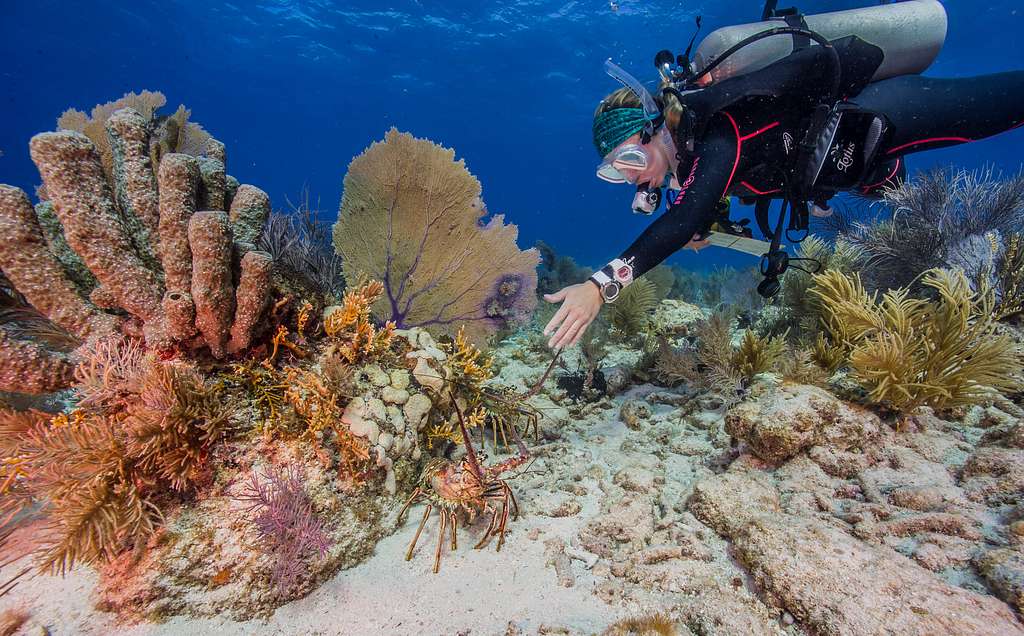
Fiji is known for its warm waters and abundant coral reefs and is considered one of the best destinations for both experienced and beginner divers.
Finally, the Red Sea in Egypt is renowned for its rich marine life and excellent visibility, making it one of the top destinations for reef diving. Belize is known for its clear waters, vibrant coral reefs, and diverse marine life, including colorful fish, turtles, and even whale sharks.
Overall, these destinations offer some of the best scuba diving experiences in the world and are must-visit destinations for any diving enthusiast.
What is the Cost of Starting Scuba Diving?
The cost of starting scuba diving varies depending on several factors such as location, type of dive, equipment rental, certification, and other services. On average, a single recreational dive can cost anywhere from $50 to $200 or more. If you’re getting certified, the cost of a basic scuba diving certification can range from $300 to $1,000 or more, including equipment and materials. Keep in mind that these costs may vary greatly depending on where you live and the type of diving you plan to do.
- Scuba Diving Equipment: A basic scuba diving equipment setup can cost anywhere from $1,000 to $3,000 or more, depending on the quality and type of equipment. This typically includes a mask, fins, snorkel, regulator, BCD, wetsuit, dive computer, and weights.
- Dive Courses: There are several types of dive courses available, ranging from introductory programs like Discover Scuba Diving to full certification courses like Open Water Diver. The cost of a dive course can range from $200 to $1,000 or more, depending on the location and type of course.
- Certification Fees: Some dive organizations charge a fee for certification, which can range from $50 to $100 or more.
- Rentals: If you don’t have your own scuba diving equipment, you can rent it from a dive shop. The cost of rental equipment can vary, but it’s typically around $25 to $50 per day.
- Travel Costs: If you plan to go on dive trips, you’ll need to factor in travel costs like airfare, accommodations, and transportation.
- Miscellaneous Fees: There may be additional fees for things like dive insurance, environmental fees, and park entrance fees.
The Benefits of Scuba Diving
Scuba diving offers a unique and exciting way to explore the underwater world. By diving, you can experience the beauty of the ocean, observe marine life up close, and enjoy the thrill of exploring new environments.
Starting scuba diving offers a number of physical, mental, and environmental benefits, including:
- Physical health: Scuba diving can improve cardiovascular fitness, increase muscle strength and flexibility, and reduce stress.
- Mental health: Diving can provide a sense of peace and tranquillity, help with stress relief, and boost overall well-being.
- Environmental conservation: Scuba diving can raise awareness of the need to protect the underwater environment, and promote conservation efforts.
- Adventure and exploration: Diving allows you to explore new environments and experience unique and exciting adventures.
- Knowledge and education: Scuba diving offers opportunities for learning about marine life, history, and geology, and gaining new skills and certifications.
- Personal growth: Diving can challenge you physically and mentally, helping you to build confidence, overcome fears, and develop a greater sense of self-awareness.
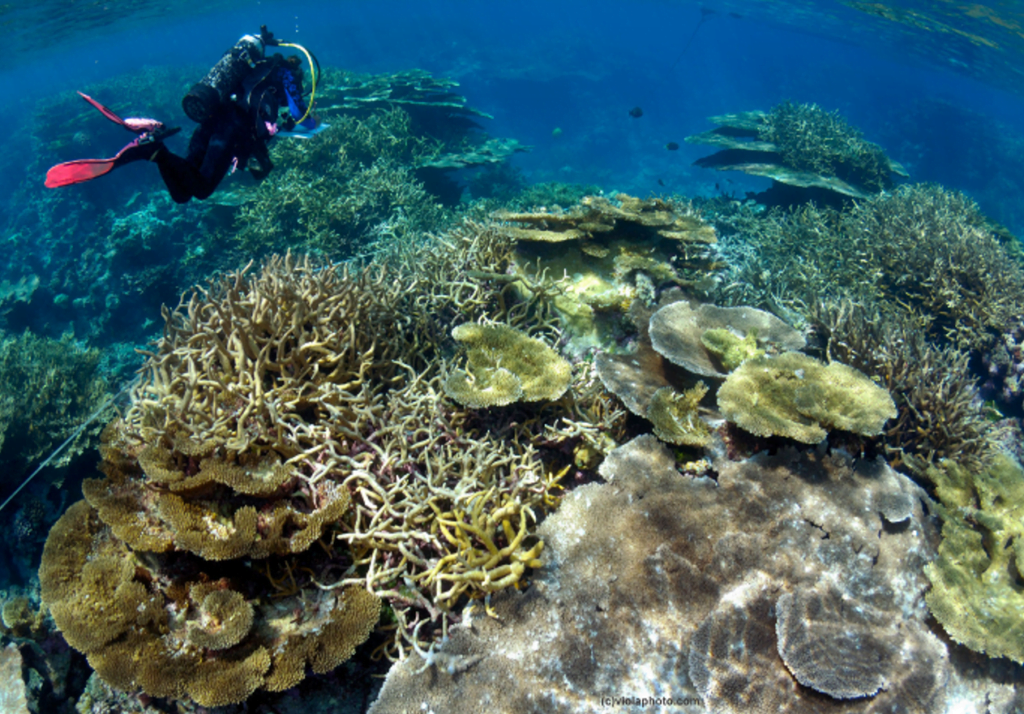
Making the Most of Your Scuba Diving Experience
To get the most out of your scuba diving experience, it is important to choose the right dive site, plan your dive, and be prepared for any emergencies that may occur. Before starting scuba diving, make sure you have a good understanding of the dive site and its conditions, as well as the type of marine life that is likely to be encountered. Planning your dive will help you stay safe and enjoy the underwater environment to the fullest.
Here are some tips to help you make the most of your scuba diving experience:
- Get proper training: Take a scuba diving course from a reputable instructor to ensure you are diving safely and responsibly.
- Choose the right gear: Invest in quality scuba diving gear that fits well and is comfortable to wear.
- Plan your dive: Research the dive site and its conditions, and plan your dive to maximize your time underwater and minimize your risk.
- Dive with a buddy: Always dive with a partner and maintain communication and visual contact while diving.
- Respect the underwater environment: Follow the principles of responsible diving, such as avoiding touching or disturbing marine life and not leaving any debris behind.
- Stay within your limits: Be aware of your own physical and mental abilities, and do not push yourself beyond what you are comfortable with.
- Take your time: Take it slow and enjoy the experience, rather than rushing through the dive.
- Keep a dive log: Record your dives to keep track of your experiences and progress as a diver.
- Join a dive club: Get involved with a local dive club to meet other divers and participate in organized dive trips and events.
Books to Read When Starting Scuba Diving
Doing it Right: The Fundamentals of Better Diving
The Fundamentals of Better Diving was written for anyone who wants to get the most out of their diving. From augmenting dive safety to increasing the enjoyment of your family’s Caribbean diving trip or planning deep cave exploration, this book outlines the essential knowledge, skills and techniques for a safer and more enjoyable diving
Scuba Fundamental: Start Diving the Right Way
Scuba Fundamental tells you how to make sure you are prepared for a scuba diving course and what a good beginner’s course should entail. It tells you how to choose a good instructor, how to decide which operators to dive with after you have finished your course, and what sort of dives you should be doing when you first start diving.
Scuba Diving
A best-selling authoritative resource, packed with full-color photographs and detailed diving instructions, this is the ideal companion for recreational divers, diving instructors, and students.
The Scuba Diving Handbook: The Complete Guide to Safe and Exciting Scuba Diving
This comprehensive reference has information for divers of all levels, from the beginning basics to advanced skills and techniques for those with more experience. With its 350 full-color photographs, easy-to-understand diagrams, and tips from professionals, this book covers everything.
Pro Advice for Starting Scuba Diving
Starting scuba diving can be an exciting and rewarding experience. By following these tips and taking the right scuba diving course, you can make the most of your underwater experience and safely explore the beauty of the ocean. So, what are you waiting for? Get ready to dive into the world of scuba diving and discover the wonders of the underwater world!
Scuba Diving FAQs
If you have questions that are not answered in this article, do check out my scuba diving FAQs page:
If you are already a qualified diver, please do share your experiences and wisdom for those starting scuba diving in the comments below!
About The Author

Andy Davis is a RAID, PADI TecRec, ANDI, BSAC, and SSI-qualified independent technical diving instructor who specializes in teaching sidemount, trimix, and advanced wreck diving courses.
Currently residing in Subic Bay, Philippines; he has amassed more than 10,000 open-circuit and CCR dives over three decades of challenging diving across the globe.
Andy has published numerous diving magazine articles and designed advanced certification courses for several dive training agencies, He regularly tests and reviews new dive gear for scuba equipment manufacturers. Andy is currently writing a series of advanced diving books and creating a range of tech diving clothing and accessories.
Prior to becoming a professional technical diving educator in 2006, Andy was a commissioned officer in the Royal Air Force and has served in Iraq, Afghanistan, Belize, and Cyprus.
In 2023, Andy was named in the “Who’s Who of Sidemount” list by GUE InDepth Magazine.
Purchase my exclusive diving ebooks!
Originally posted 2023-02-01 13:53:02.


